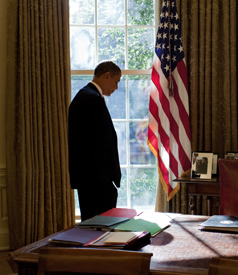Imagine that Barack Obama, upon taking office in January 2009, had decided to deliver on his campaign promise to “to end business-as-usual in Washington so we can bring about real change.” Imagine that he rejected the architects of the pro-Wall Street policies that had led to economic collapse, such as Larry Summers, Tim Geithner, and the stable of former Goldman Sachs employees that runs the U.S Treasury Department, and instead appointed Nobel laureate economists Paul Krugman and Joe Stiglitz to key positions including the chair of the Federal Reserve.
Instead of Hillary Clinton, who lost the Democratic presidential primary because of her unrelenting support for the Iraq war, imagine that he chose Senator Russ Feingold for Secretary of State, or someone interested in delivering on the popular desire to get out of Afghanistan. Imagine a real health care reform bill, instead of health insurance reform, that didn’t give the powerful pharmaceutical and insurance lobbies a veto.
It goes without saying that President Obama would be vilified in the major media outlets. The seething hostility from right-wing blowhards such as Glenn Beck and Rush Limbaugh would be matched by more mainstream media outlets, who would accuse the president of polarizing the nation and “dangerous demagoguery.” With almost all of the establishment media and institutions against him, Obama would likely face a constant battle for political survival – although he might well triumph with direct, populist appeals to the majority.
This is what has happened to a number of the left-of-center governments in Latin America. In Ecuador, President Rafael Correa was re-elected by a large margin in 2009, despite strong opposition from the country’s media. In Bolivia, Evo Morales has brought stability and record growth to a country that had a tradition of governments that didn’t last more than a year – despite the most hostile media in the hemisphere and unrelenting, sometimes violent opposition from Bolivia’s traditional elite. And President Hugo Chavez survived a U.S. backed military coup-attempt and other efforts to topple his government, winning three presidential elections, each time by a larger margin.
All of these presidents took on entrenched oligarchies and fought hard to deliver on their promises. Morales, Bolivia’s first indigenous president in a country with an indigenous majority, re-nationalized the hydrocarbons (mostly natural gas) industry and created jobs through public investment, as well as getting a new, more democratic constitution approved. Correa doubled spending on health care and cancelled $3.2 billion of foreign debt found to be illegitimate. Chavez cut poverty in half and extreme poverty by more than 70 percent after getting control over the country’s oil industry.
These presidents faced another obstacle that Obama wouldn’t have – they had to fight with the most powerful country in the world in order to deliver on their promises. This was also true of President Nestor Kirchner in Argentina (2003-2007), who had to battle the Washington-dominated International Monetary Fund in order to implement the economic policies that made Argentina the fastest growing economy in the hemisphere for six years.
Of course, Hugo Chavez has been the most demonized in the U.S. media – but that is not because of what he has said or done but because he is sitting on 500 billion barrels of oil. Washington has a particular problem with oil-producing states that don’t follow orders – whether they are a dictatorship like Iraq, a theocracy like Iran, or a democracy like Venezuela.
All of these leaders – including President Lula da Silva of Brazil – had hoped that President Obama would pursue a more enlightened policy toward Latin America, but it hasn’t happened. It seems that Washington, which was comfortable with dictators and oligarchs who ran the show for decades, still has problems with democracy in its former “back yard.”
This op-ed was also published by McClatchy Tribune Information Services on July 7, 2010 by the Sacramento Bee (CA) and other newspapers.
Mark Weisbrot is co-director of the Center for Economic and Policy Research, in Washington, D.C. and is president of Just Foreign Policy. He is also co-writer of Oliver Stone’s current documentary, “South of the Border,” now playing in theaters.
Press freedom is under attack
As Trump cracks down on political speech, independent media is increasingly necessary.
Truthout produces reporting you won’t see in the mainstream: journalism from the frontlines of global conflict, interviews with grassroots movement leaders, high-quality legal analysis and more.
Our work is possible thanks to reader support. Help Truthout catalyze change and social justice — make a tax-deductible monthly or one-time donation today.
